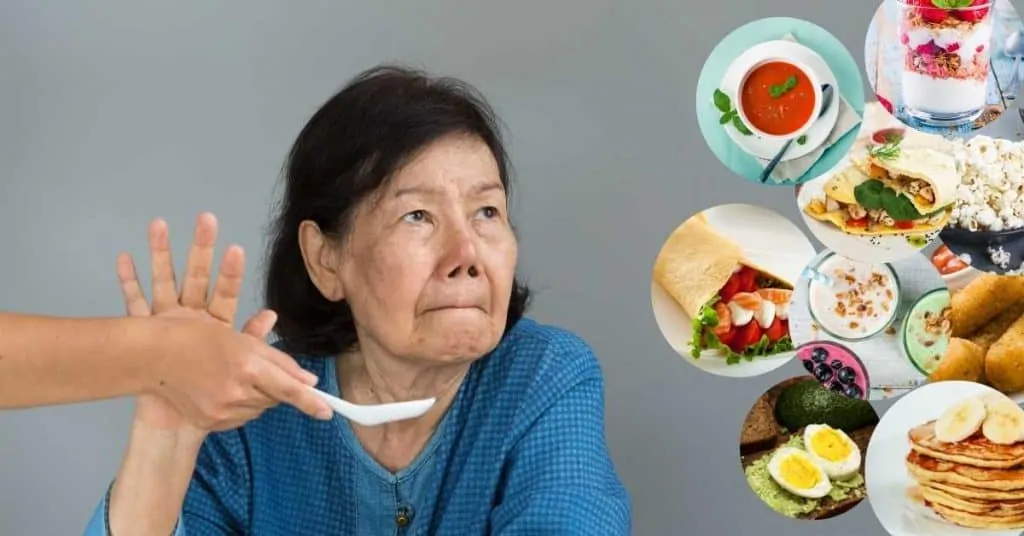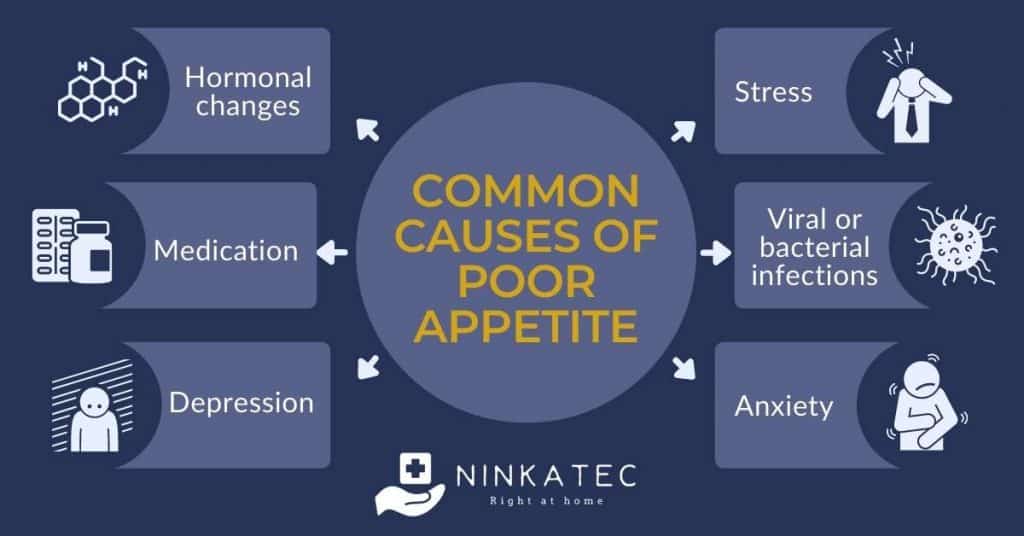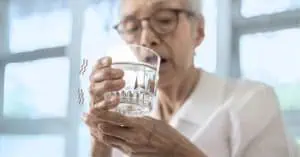We often hear our elderly loved ones complain about decreased appetite. With weaker taste buds and sedentary routines, their bodies are less likely to signal the hunger response that prompts them to eat. However, it is essential for your elderly loved ones to eat nutritious meals, get enough calories, and maintain a healthy and stable weight.
In this guide, we talk about ways to stimulate appetite and outline the best appetite-increasing foods that senior adults can incorporate into their diets. We also discuss social and psychological factors that influence appetite and share ideas of how to leverage them to boost appetite for older adults.
Table of Contents
1. Common Causes of Decreased Appetite
Loss of appetite refers to a general disinterest in eating. A lack of hunger is commonly reported with loss of appetite, and they are indeed related. However, these are different concepts. While hunger is a biological response to the body's need for nutrients and energy, appetite is a complex interplay of biological, psychological, and environmental factors. Appetite can be influenced by emotional factors, habits, and environmental cues.
As such, loss of appetite has physical and/or psychological causes, including:
- Viral or bacterial infections (e.g. stomach flu, cold, food poisoning, etc.)
- Hormonal changes in the body
- New medication/s
- Stress
In this case, appetite typically returns after the causes are resolved, such as when the infection subdues, the person switches to a different medication, or when the stressor causing poor appetite has been dealt with.
Loss of appetite may also be a symptom of an underlying medical condition that needs diagnosis and treatment. Changes in eating habits are common among patients with mental disorders (e.g., anxiety, depression), thyroid disorders, hepatitis, dementia, or cancer. Learn more about medical causes that could manifest with loss of appetite as a symptom here.
In general, if an elderly experiences a sudden loss of appetite, especially with other symptoms such as nausea, vomiting, abdominal pain, or diarrhoea, we highly recommend consulting a doctor. Persistent lack of appetite without obvious causes and other symptoms should also be investigated by medical professionals.
2. How Ageing Can Lead to Poor Appetite
Senior adults tend to eat less due to the natural decrease of taste buds and a reduced sense of smell. These changes make meals less enjoyable, gradually leading to a disinterest in food.
Adults over the age of 60 also tend to have more sedentary lifestyles. This decline in physical activity means that their bodies do not use up as much energy, which in turn affects the amount of food they need daily.
In some cases, poor eating habits are the result of other medical conditions that older individuals are more prone to. For instance, elderly individuals may eat less due to poorly-fitted denture or pain while chewing or swallowing. Read our post on common oral and swallowing issues among elderlies to find out how this under-discussed issue can take eating pleasure away from your senior loved ones.
3. Best Foods for Elderly Individuals with No Appetite
To help elderly loved ones restore healthier eating habits, you can offer healthier versions of their favourite meals or new, exciting dishes. Here’s a list of tasty, nutrient-rich foods that can be incorporated into their diet to increase appetite.
- Avocado Toast with Egg
Avocados are rich in antioxidants, vitamins, and fibre. They also improve cardiovascular health. Pairing this fresh fruit with toast and egg results in a well-balanced meal full of essential macronutrients, especially protein and carbohydrates.
- Banana Pancakes
In comparison with other fruits, bananas are higher in calories, which is ideal for seniors with a decreased appetite. These pancakes can be topped with almond butter or berries for additional, flavourful calories that pack a tasty punch.
- Salmon Burrito
Salmon contains omega-3 fatty acids which improve cardiovascular health. Combining protein-rich foods with high-calorie foods like rice and flour tortillas creates a balance between good nutrition and adequate calories.
- Smoothies
Fruits and vegetables are packed with nutrients and vitamins that senior adults need to maintain good health. Smoothies are easy to consume for elderly individuals with dental issues or swallowing difficulty, and they can easily help them reach their daily maintenance calories with little effort.
- Stovetop or Air-Popped Popcorn
As senior adults work on improving their appetite, you must avoid overwhelming them with big meals. Healthy snacks like stovetop or air-popped popcorn may encourage them to eat more frequently throughout the day and get the calories they need.
- Turkey Omelette with Rice
Turkey is an excellent source of protein and contains very little saturated fat, making it more nutritious than most red meats. When mixed with high-calorie food like rice, elderly loved ones with poor appetites can get important nutrients and maintain a healthy weight.
- Red Pepper and Tomato Soup with Croutons
High-calorie soups are great for ageing adults. Liquid calories are typically easier to consume and less likely to keep them full for long periods. The herbs and spices in this dish also enhance flavour, which may encourage them to eat more.
- Yoghurt Parfait
For a healthy dessert for elderly loved ones, consider yoghurt parfaits. Ingredients like fruits, granola, and chia seeds are mixed with a fresh cup of frozen yoghurt. Besides being an easy snack for elderly adults to eat, yoghurt provides a rich source of calcium and protein which can improve their muscle and bone health.
4. Setting a Regular Eating Schedule and Meal Plan
It is highly recommended for individuals with poor appetites to eat 5-6 small meals throughout the day. A regular eating schedule can help senior adults hit their nutrition targets and promote better digestion.
Water can take up space in the stomach, leading to a feeling of fullness and reducing hunger. A person may also think they are hungry when they are actually thirsty. Drinking a glass of water before reaching for something to eat can help curb unnecessary snacking.
5. Encourage Physical Activity
Exercise is linked to a temporary increase in the body’s metabolic rate. Since both metabolism and appetite increase after a workout, physical activity may help elderly loved ones eat more.
While exercise is generally recommended for its health benefits, not all types of exercise are beneficial to older persons. Existing medical conditions may limit the types of exercises an ageing individual can safely engage in, so it is important to consult a physician beforehand. Here are a few simple recommended exercises for elderly to stay active.
6. Enhancing Appetite through Social and Psychological Bonds
Since appetite is influenced by a range of factors beyond the body's immediate nutritional need, such as emotional factors, personal habits, and the social context of food, it is beneficial to address appetite from its psychological and social angles. We all know that we enjoy a meal better when we are in good company or in a happy mood.
Here are a few ideas to make meals and food more delightful for our senior loved ones:
- Make family mealtime a routine: Keeping the elderly's company during mealtime can strengthen family bonds, elevate the dining experience and boost their appetite, especially for the seniors who often socialise less compared to younger people.
- Planning dishes and cooking together: Getting the senior involved in planning daily meals or the family weekend treat can help the elderly look forward to eating, which can potentially be an appetite stimulant.
- Organise teatime: Teatime is an excellent occasion when our elderly loved one can get extra nutrition and get social at the same time. You can invite a relative or a friend to come over for teatime with the elderly and prepare the tea and food in advance. The seniors can have a good time even if you are working or busy during the day.
- Make mealtime happy time: Mood can influence appetite. Positive emotions often enhance the desire to eat while negative emotions may lead to a diminished appetite. You can create a positive mood during mealtime by playing light music (instead of watching news or dramas on TV), sharing fun stories, talking about happy topics, and savouring the food together.
7. Takeaway Message
Loss of appetite can lead to weight loss and malnutrition among senior adults. Deficiencies in vital nutrients can exacerbate existing medical conditions or contribute to the development of new health issues. For example, a deficiency in vitamin D may increase bone fragility, while inadequate protein intake can contribute to sarcopenia or muscle loss. As we age, consuming adequate and nutritious calories becomes increasingly important to keep our immunity strong, and safeguard our general health.
Loss of appetite can have complex physical and psychological causes. Thus, treatment for loss of appetite in elderly necessitates exploring solutions beyond pharmaceutical interventions. Consult a doctor if you or a senior loved one experiences prolonged poor appetite without a clear cause, or feels a lack of appetite while experiencing other symptoms. At home, finding creative ways to make food and mealtime enjoyable can significantly boost appetite.










